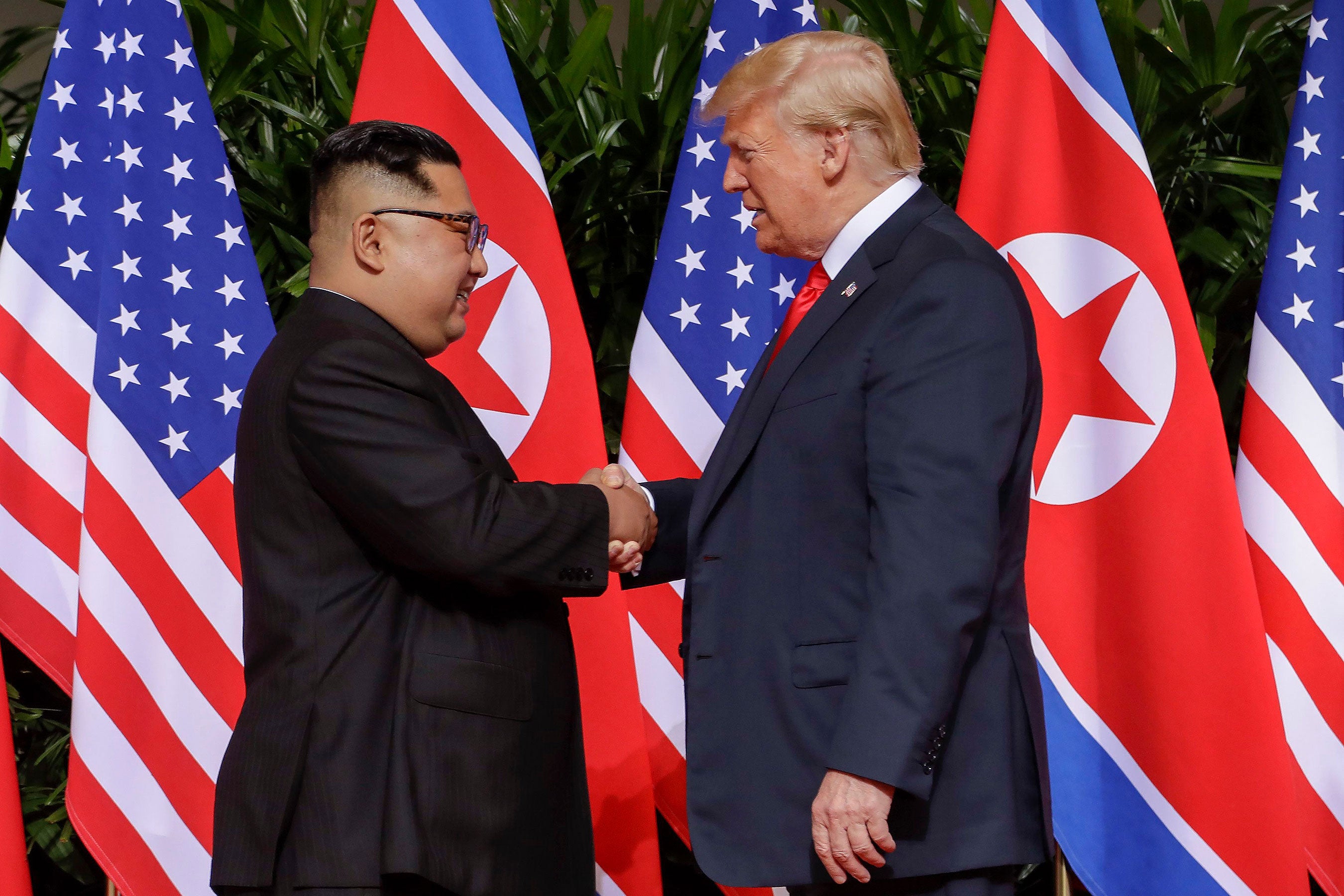
After much fanfare, U.S. President Donald Trump and Kim Jong-un, leader of the Democratic People’s Republic of Korea (DPRK), met for a much-anticipated summit on June 12, 2018. The summit marked the first in-person meeting between a sitting U.S. President and a North Korean head of state.
The parties reached a written agreement after a period of one-on-one negotiations and a session including key senior advisors. The statement, signed by both Trump and Kim, committed the DPRK to “work toward complete denuclearization of the Korean Peninsula.” SFS faculty members weighed in on the impacts of the summit on denuclearization.
Conceding Before Meeting
Some experts argued that Trump agreeing to meet with Kim in the first place represented a concession on the part of the United States. “The photo opportunity of a face-to-face meeting with the leader of the free world is the ultimate legitimizer for this nuclear rogue state,” wrote Victor Cha, D.S. Song-KF Endowed Chair in International Affairs, in the New York Times.
The legitimization of the DPRK has changed the international landscape in regards to relations with North Korea, according to Professor Michael Green, Director of the Asian Studies Program. “He couldn’t even get a meeting with Xi Jinping, leader of China, because he had been defying the international community with nuclear missile tests,” Green said in a podcast produced by CSIS, where he is Senior Vice President for Asia and Japan Chair. Since the Singapore summit was agreed to, countries like China, South Korea, and Russia met or have planned meetings with the DPRK leader. “Donald Trump opened the door to everyone meeting with Kim Jong-un,” Green said.
Daniel Nexon, associate professor at Georgetown University specializing in international security and international-relations theory, questioned the notion of legitimacy in his co-authored article in Foreign Affairs. “How might Kim use the legitimacy associated with North Korea’s newfound status for international gain? Historical evidence suggests it is more difficult to contain revisionist states when they can persuade (at least some) audiences of the legitimacy of their aims. If North Korea can now make a claim to being a member in good — or, at least, better — standing of the international system, then it might be more difficult to continue to isolate the Kim regime, even if it fails to move on denuclearization.”
Expected Results?
Before the summit, Georgetown professor Charles Kupchan predicted the result of the meeting between President Trump and Chairman Kim. “My best guess is that the leaders will declare that they have reached a broad agreement to move forward toward a peace treaty, normalization and denuclearization,” he said. “They will then task their teams to turn their agreement into reality.”
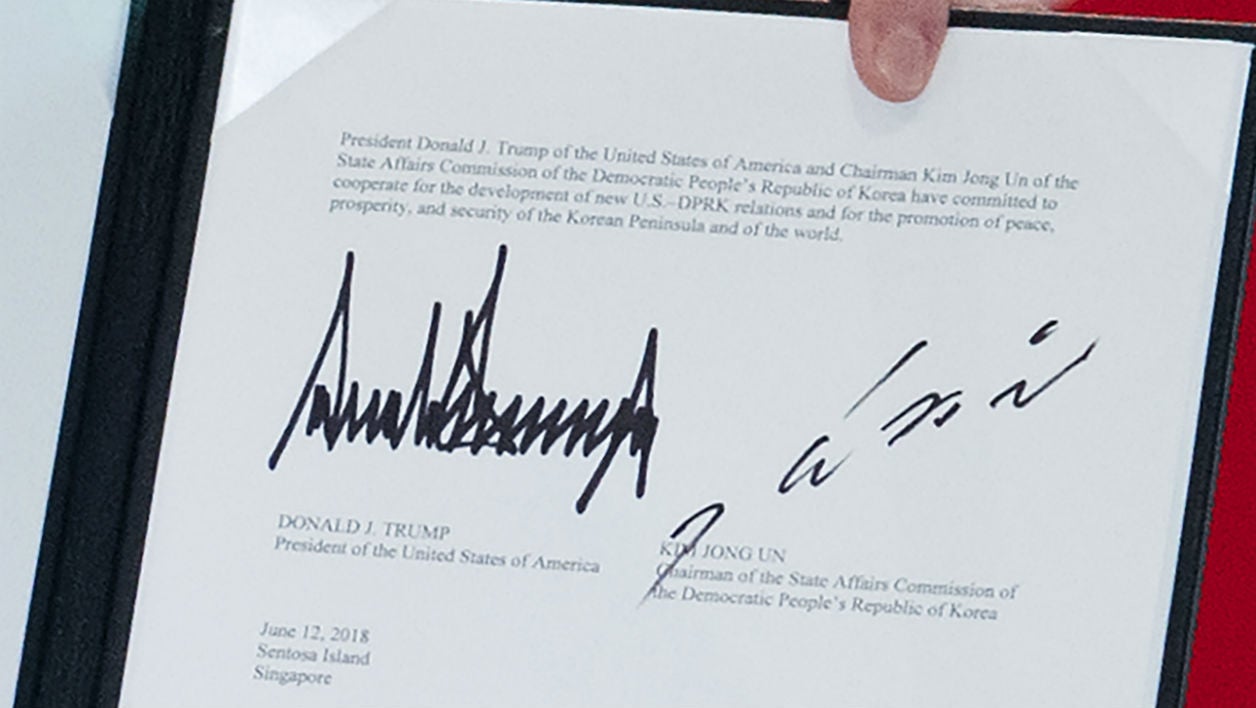
Kupchan’s prediction was apropos; the agreement signed by Trump and Kim has been described as vague, nonbinding, and lacking key language previously sought by the United States in similar accords. “Kim Jong-un may be a new and different leader, but there is nothing in the June 12 Singapore Joint Statement that would constitute a new commitment by the North to denuclearization,” explained Green in testimony to the Asia and Pacific Subcommittee of the U.S. House Committee on Foreign Affairs. As Cha said in the CSIS podcast, the statement did not include the term “verifiable denuclearization,” which would have carried the implication of international access to North Korea’s nuclear facilities. In addition, the agreement did not commit to a specified timeline for denuclearization. In a press conference following the summit, Trump admitted that the current agreement “doesn’t mean enough” and that Secretary of State Mike Pompeo needed to “get the ball over the goal line” in reaching a more comprehensive, detailed, and binding accord.
For SFS professor Dennis Wilder, the summit provided an important first step within the scope of a longer negotiation process. “Kim is now locked into a process,” said Wilder on Fox News. “He’s been telling his people that he has gotten something from the summit.” Cha echoed the same sentiments, writing that the summit “represents the start of a process that takes us away from the brink of war.”
War Games and International Posture
A surprise concession made by Trump during the negotiations startled American allies. He pledged to cancel allied military exercises between South Korea and the United States, sending Seoul, Tokyo, and the Pentagon scrambling for answers. Following Trump’s statement, officials in D.C. confirmed that “war games” may be terminated, but regular readiness and preparation trainings with the United States’ allies in Asia will continue as scheduled.
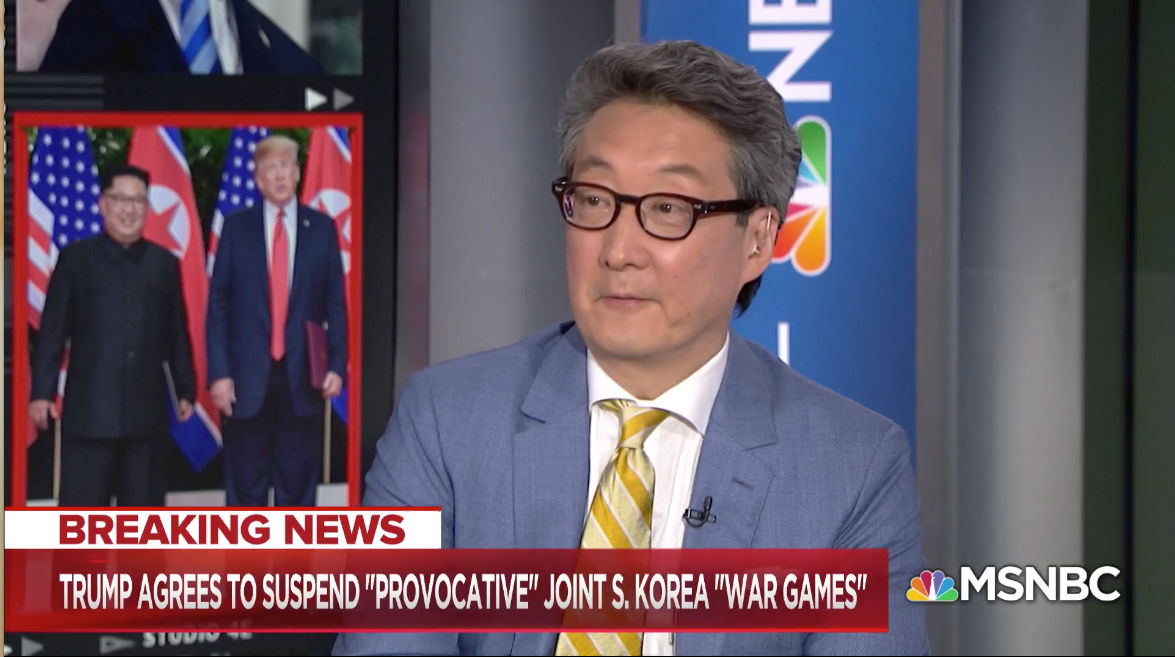 On MSNBC, where he is a contributor, Cha said that Trump’s pledge to cancel the joint exercises was a surprise to South Korea. “They had no idea.”
On MSNBC, where he is a contributor, Cha said that Trump’s pledge to cancel the joint exercises was a surprise to South Korea. “They had no idea.”
Oriana Skylar Mastro, Assistant Professor of Security Studies, noted that eliminating these trainings has always been a goal of China’s. “The fact that the United States is now willing to negotiate about its military activities and its force posture is something that China has been pushing for,” Mastro said to Voice of America. “China is going to try to kind of milk this for as much as they can before it falls apart.
Mastro further elaborated on her points in an article for Foreign Affairs, pointing out, “the effects of China’s diplomatic ingenuity will reverberate far beyond North Korea. In the game between great powers, China just scored multiple points against the United States. And if China is able to continue leveraging the North Korea issue to radically weaken U.S. alliances, reduce U.S. military presence and operations, and undermine the legitimacy of the U.S. role in the region, it will be game over for Washington in the Asia Pacific.”
Cha added that the United States did not receive a serious commitment in return for stopping the military trainings. “Stopping the joint exercises has been a long-term goal for North Korea and China,” he wrote in an analysis for CSIS. “Trump delivered it while getting nothing in return beyond the same generalities that North Korea has been offering since the early 1990s.”
Blast from the Past
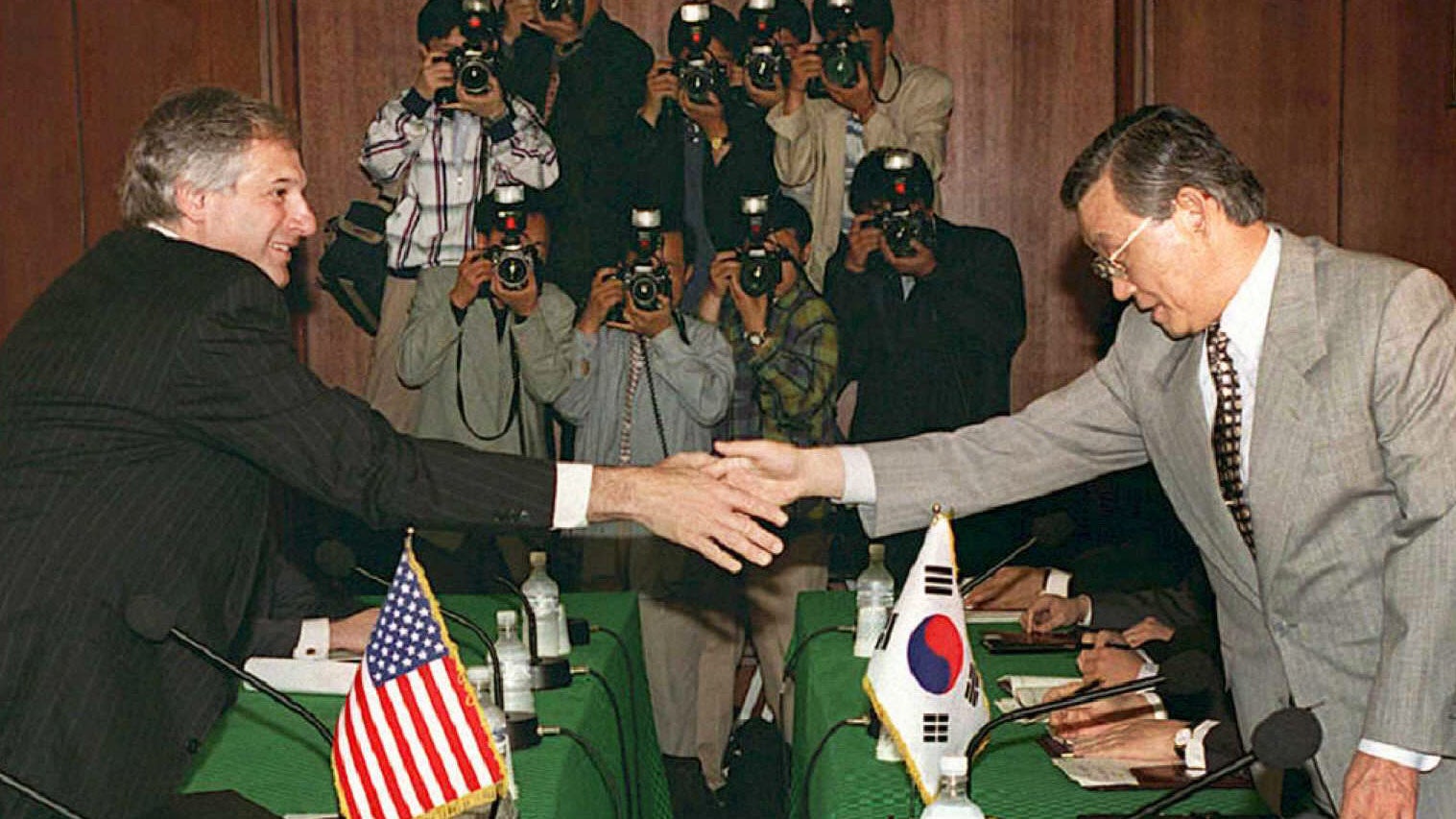
Ambassador Robert Gallucci, SFS Distinguished Professor in the Practice of Diplomacy and the chief U.S. representative during the North Korean crisis of 1994, reflected on his experience negotiating with the DPRK government on PBS Newshour. In 1994, the United States and North Korea, according to Gallucci, agreed to a framework that he said should have “resolved the outstanding issue over the DPRK nuclear program.”
Green, who served as senior director of Asian affairs for President George W. Bush’s National Security Council, noted that the DPRK did not follow the agreement reached by Gallucci, leading to its eventual failure. “The North Koreans were not prepared to give up nuclear weapons,” he said. “These weapons are just too essential for their survival.”
Matthew Kroenig, Associate Professor of Government, is skeptical about the potential that President Trump’s most recent agreement will be followed by the North Korean government. “We’ve had an agreement in 1994, 2005, and 2012, all of which the North Koreans have broken. I fear we are going to see this movie played again,” he said in an interview with CBS News.
However, Kroenig also noted that some senior security experts are more optimistic about the deal’s potential for success. He suggested that this may be a strategic decision used by Kim Jong-un to follow the path of economic modernization taken by other formerly communist countries like Vietnam and China. SFS adjunct professor William Brown agreed, noting that Kim said himself that he wanted to learn from Singapore’s economy while visiting. But Brown also took Kim’s words with caution, adding that it is possible he learned the “wrong lessons” from the summit in Singapore.
A Disregard for Human Rights?
While the United States has historically maintained close relationships with many countries accused of human rights abuses, such as Saudi Arabia, some experts argued that the summit with North Korea ignored the DPRK regime’s disregard for human rights. However, there is less opposition to North Korea within the United States when compared to other countries with oppressive regimes. “We don’t have, in the United States, a domestic constituency that is as opposed to Kim Jong-un as there was that was opposed to Castro and the Castro regime,” said Anthony Clark Arend, SFS professor and Vice Dean. “That’s one important difference.”
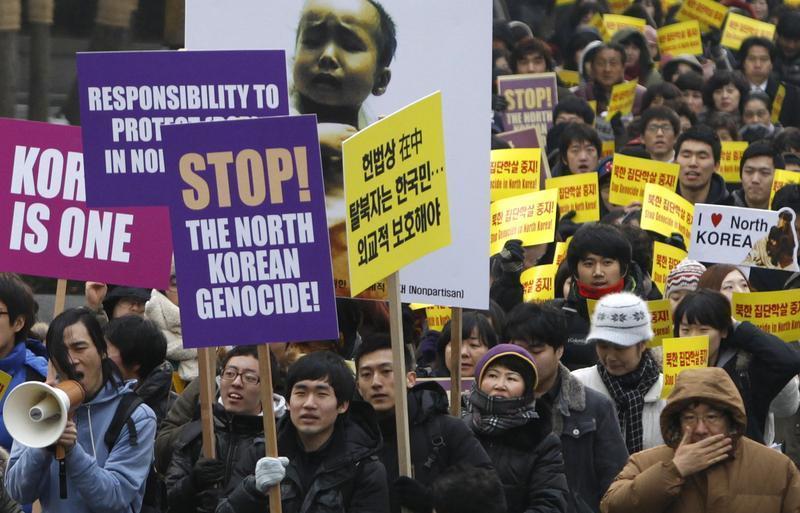
Prior to the summit, Nicole Bibbins Sedaca, SFS Professor in the Practice of Diplomacy, advocated for including human rights issues as part of its negotiations in an op-ed for Foreign Policy. She argued that it is “the morally right thing to do, but it is also directly linked to the security situation, central to U.S. policy toward North Korea, and key to building congressional support for any progress or deal the president is able to make.”
However, the topic of human rights was not mentioned in the agreement signed by the two leaders. In an op-ed for Foreign Policy, Green wrote that President Trump’s treatment of Kim Jong-un during the summit was effectively a “pardon,” as the President ignored the country’s egregious human rights abuses and instead lauded the DPRK leader with compliments. According to Green, “It is hard to see what we have achieved for the North Korean people or the safety of the world in exchange for pardoning Kim.”